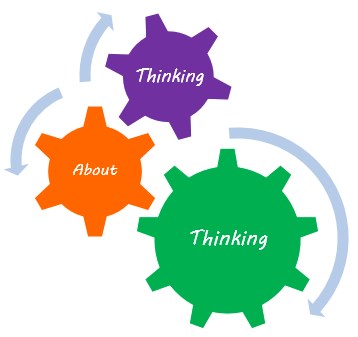Metacognition
Thinking about Thinking (Metacognition)
Thinking about thinking is a higher order thinking that enables understanding, analysis, and control of your cognitive processes. It involves planning, monitoring, assessing, and evaluating your use of your cognitive skills.
Metacognition Defined
Metacognition is the term used to define “thinking about thinking.” Metacognition literally translates cognition about cognition – “thinking about thinking.” It is your ability to understand and control your thinking process.
Background
This higher order of thinking was introduced by psychologist John Flavell in the 1970’s. Flavell coined the term – metacognition. However, the concept of reflecting on your own thoughts and thinking process dates back to Plato, who emphasized the importance of self-reflection and self-awareness.
About Metacognition
- How do you learn how to learn?
- How do you learn best?
- How do you approach a specific learning task?
- How do you approach a problem to solve?
- How do you know which approach worked best?
These are questions addressed by the concept of metacognition. Metacognition is about understanding how you learn, and knowing when and how to use particular strategies for learning and/or problem solving.
Metacognition is about your ability to use your knowledge of your thinking process to:
- plan a strategy for approaching a learning task
- create steps to solve a problem
- reflect on actions taken
- evaluate results
- modify your approach
Developing Metacognitive Abilities
Developing metacognitive abilities is not just about becoming a reflective learner and thinking about your thinking process. It is also about developing learning strategies to help you approach learning and problem solving tasks. It helps you choose the best approach or strategy for a given task. Metacognition plays an essential role in your learning and development process.
Elements of Metacognition
There are two elements of metacognition:
- Knowledge – understanding what you know about yourself as cognitive processor
- Regulation – managing or controlling how you go about learning or problem solving
Metacognitive Knowledge
Metacognitive knowledge refers to what you know about yourself as cognitive processor. Knowledge includes what you know about how you perceive, process, organize, and understand information. It also includes knowing how you learn best or the best way you can accomplish a task or solve a problem. Your knowledge of these factors can be used to manage and control your cognitive processes.
Metacognitive knowledge can be divided into three categories:
- knowledge variables
- task variables
- strategy variables
Person variables: What you recognize about your strengths and weaknesses in learning and processing information.
Task variables: What you know about the nature of a task and the processing demands required to complete the task.
Strategy variables: What you know about different strategies you can apply to successfully accomplish a task.
Cognitive Regulation
Cognitive regulation is about control over your thinking processes involved in learning and problem solving. It involves understanding, implementing, and managing strategies for processing information.
Strategies are those mental skills and abilities you use to approach and process information. It involves the way you think, study, and learn. Strategies help you comprehend information or solve problems. They may be specific methods you use to learn a task or adjustments you make to accomplish a task.
Metacognitive strategies include:
- planning how to approach a learning task
- using appropriate skills and strategies to solve a problem
- monitoring comprehension
- becoming aware of distractions
- using visual or auditory tools to help process information
- self-assessing and correcting based on assessments
- evaluating progress toward the completion of a task
Related Links
Convergent and Divergent Thinking


